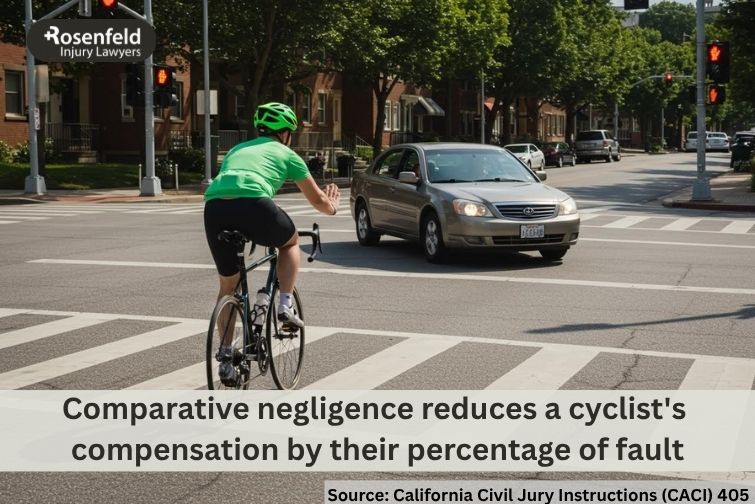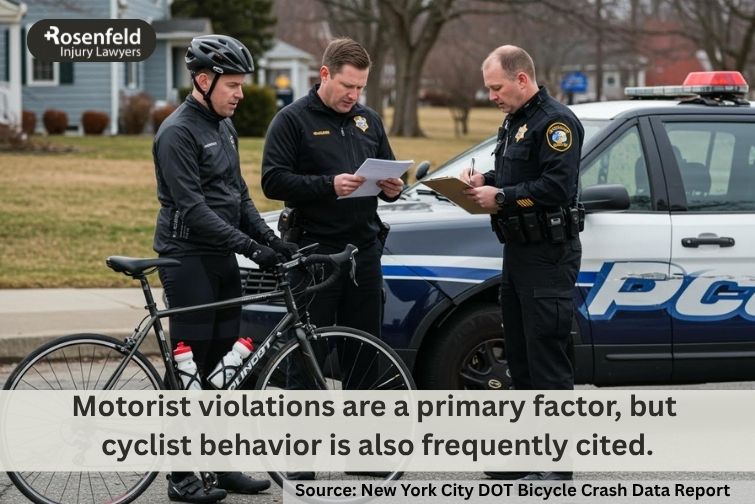Accident Lawyer
What Is the Role of Comparative Negligence in Bicycle Accidents?
Comparative negligence in bicycle accidents plays a significant role in determining how much compensation an injured cyclist can recover after a crash.
When both the cyclist and the driver share some degree of fault, Illinois law uses principles to divide responsibility and adjust damages accordingly. This legal framework ensures that victims can still seek compensation even if they were partially at fault for the incident.
Cyclists often face complex legal challenges after collisions with motor vehicles, especially when insurance companies try to minimize payouts by claiming the rider violated traffic laws or contributed to the crash. Understanding comparative negligence is essential to building a compelling case and recovering fair compensation for medical expenses, lost wages, and pain and suffering.

What Is the Comparative Negligence Law in Illinois?
Under 735 ILCS 5/2-1116, Illinois follows a modified comparative negligence system. This law allows injured individuals, such as cyclists, to recover damages in a civil lawsuit even if they are partially at fault for the accident. However, the injured party’s compensation is reduced by their percentage of fault, and they cannot recover anything if they are found more than 50% at fault.
For example, if a cyclist is awarded $100,000 but found 25% responsible for the crash because they failed to obey traffic signals, their recovery would be reduced to $75,000. If the cyclist were found over 50% at fault, they would not be eligible to recover damages.
This rule plays a significant role in bicycle accident cases because it ensures a fair allocation of responsibility between the parties involved. Both the cyclist and the motorist must exercise reasonable care and follow traffic laws. If either party fails to do so, the court weighs their conduct to determine the proper degree of fault and potential compensation.
What Is the Difference Between Comparative Fault and Contributory Negligence?
Although the terms are often used interchangeably, there’s a key legal distinction between comparative and contributory fault.
- Comparative negligence (or comparative fault) allows an injured party to seek compensation even if they share some responsibility for the accident. The damages are adjusted based on the percentage of fault assigned to each party.
- Contributory fault, on the other hand, is far stricter. In states that follow this rule, if the injured person is found even 1% at fault, they are barred from recovering any damages.
Illinois follows the fairer modified comparative fault approach. This change recognizes that accidents are rarely black and white. Often, multiple factors or behaviors contribute to the collision.
How Does Illinois Compare to Other States in This Regard?
Across the United States, states differ in how they handle negligence and fault in personal injury cases:
- Pure Comparative Fault – States such as California, New York, and Florida follow this system. Under pure comparative negligence, an injured person can still recover damages regardless of their share of responsibility, even if they were mostly to blame for the accident, up to being 99% at fault. Their compensation is simply reduced by their extent of negligence.
- Modified Comparative Fault (50% Rule) – States like Illinois, Michigan, and Colorado use this rule. Victims can recover damages only if they are less than 50% at fault.
- Modified Comparative Fault (51% Rule) – Some states, such as Texas, Indiana, and Arkansas, set the cutoff at 51%, meaning victims can recover if their fault does not exceed 50%.
- Contributory Fault – A few jurisdictions, including Alabama, Maryland, North Carolina, Virginia, and the District of Columbia, still apply this outdated rule. In these states, being even slightly at fault completely bars recovery.
Illinois’ modified comparative fault system strikes a balance between fairness and accountability. It prevents unjust outcomes where a slightly negligent cyclist would otherwise receive nothing, while still discouraging reckless or careless behavior on the road.
What Role Does Comparative Negligence Play When Determining Liability in a Bicycle Accident Case?
In bicycle accident cases, comparative negligence plays a major role in determining liability and how much compensation an injured cyclist can recover. When both the driver and the cyclist share responsibility, Illinois courts and insurance companies analyze the share of liability assigned to each party based on modified comparative negligence.
The process involves reviewing all relevant evidence—witness statements, medical reports, physical evidence, and camera footage—to determine how much each party contributed to the collision. For example, if a driver failed to yield while turning left, but the cyclist was also speeding or failed to obey traffic signals, each side may bear partial blame.
Under Illinois law (735 ILCS 5/2-1116), the cyclist’s percentage of fault directly impacts the amount of compensation they can recover. If comparative negligence applies and the cyclist is less than 50% at fault, they can still recover compensation, but their award will be reduced by their assigned share of fault. If they are found more than 50% at fault, they cannot recover at all.
Joint and Several Liability
When multiple parties are involved, 735 ILCS 5/2-1117 comes into play. This statute governs joint and several liability, which determines how damages are divided among defendants.
- A defendant found 25% or more at fault can be held jointly and severally liable for all medical expenses.
- For non-medical damages (such as pain and suffering or lost wages), a defendant is only severally liable for their proportionate share of fault.
This means that if more than one party contributed to the cyclist’s injuries, each may be required to pay their fair portion of the damages, ensuring that the injured cyclist is not left uncompensated because one party lacks sufficient insurance or assets.
Comparative negligence and joint and several liability work together to create a balanced approach to determining fault for the incident. They encourage all parties to follow traffic laws and help ensure that those who suffer serious injuries in bicycle accidents can still seek fair compensation, even when multiple factors led to the crash.
How an Experienced Bicycle Accident Lawyer Can Help
Bicycle accident cases involving comparative negligence can be complex. An experienced Chicago bicycle accident lawyer understands how presenting compelling evidence plays a strong role in challenging unfair insurance claims and how it can significantly impact the amount of compensation awarded, even when the cyclist is partially responsible.
Our law firm provides:
- Thorough investigation of the accident scene, including photos and witness statements.
- Review of traffic laws under the Illinois Vehicle Code to determine if motorists or cyclists failed to follow traffic regulations or exercise reasonable care.
- Collaboration with accident reconstruction experts to clarify events contributing to the crash and establish the share of liability.
- Direct communication with insurance providers to protect clients from lowball settlements.
- Assistance in filing a personal injury lawsuit when necessary to obtain damages for medical bills, lost wages, and pain and suffering.
By building a compelling case, our attorneys help injured cyclists recover compensation for serious injuries and protect their rights throughout the legal process.

What Evidence Is Needed to Determine Fault for the Accident?
Proving fault in a bicycle accident requires gathering evidence that clearly shows how the crash occurred and who violated Illinois traffic laws under the Illinois Vehicle Code (625 ILCS 5/). A thorough investigation helps establish each party’s potential liability and degree of fault, which is crucial in comparative negligence cases.
Eyewitness Accounts
Statements from people who saw the accident can clarify the events leading up to the crash, including whether either party failed to obey traffic laws.
Police Reports
Official police reports document key facts such as citations, roadway conditions, and witness information. These reports often serve as a foundation for establishing liability and negotiating with insurance companies.
Traffic Cameras and Photos
Images or video from traffic cameras, bike lanes, or nearby businesses can reveal distracted behavior, a car door opening into a cyclist’s path, or a driver running a red light or stop sign.
Medical Records
Detailed medical records link the cyclist’s injuries to the crash and help determine the extent of damage, which is a major factor in calculating how much compensation may be available.
Physical Evidence
Skid marks, damaged bicycles, and debris from the accident scene provide compelling evidence of speed, impact angle, and fault. This physical evidence supports the cyclist’s case when comparative negligence applies.
Secure Expert Legal Representation
At Chicago Bike Injury Lawyers, we understand the legal complexities of bicycle accident cases and how comparative negligence applies under Illinois law. Our team offers personalized legal representation to help clients secure compensation for their injuries and losses in such cases.
We work on a contingency fee basis, meaning you pay no upfront costs and no attorney fees unless we recover money for you. Every client receives a free consultation to discuss their case and learn how Illinois’ comparative fault laws may affect potential compensation.
If you or a loved one was injured in a bicycle accident, contact our firm today for a free, confidential consultation. We’re here to help you understand your rights, protect your claim, and pursue the compensation you deserve.
Content reviewed by Chicago bicycle accident lawyer Jonathan Rosenfeld of Rosenfeld Injury Lawyers LLC, who holds negligent drivers, municipalities, and corporate defendants accountable to protect injured cyclists and their families, and is a trial lawyer recognized by National Trial Lawyers, Best Attorneys of America, and the National Association of Personal Injury Attorneys for high-severity injury claims.








